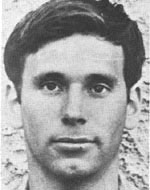Arnon, Yaron (Roni)
Son of Hanoch and Aliza. He was born on February 22, 1955 in Jerusalem, where he spent his first three years in Africa, where he returned to the Gymnasium in Rehavia and completed his elementary and high school studies in a biological- As a member of the “Masada” tribe and as a guide in the tribe of Modi’in, and the bad relations that connected him to members of the Modiin tribe led him to continue his training activities while he was on leave from his military service. Before enlisting in the IDF, Roni joined the Nahal paramilitary group Re’im for a year of service Aware of the development towns of Yeruham. Ties with youth Yeruham not cut off even during his military service. The service Yeruham year-exploited for studies at son of-Gurion University in Beersheba. Mid-November 1974 was drafted into the army and volunteered Ronnie Air Force. He took a navigational course at the Flying School and was assigned as a pilot in an air crew. In March 1977, he was awarded the rank of lieutenant colonel and was promoted to lieutenant. In his opinion, the superiors wrote: “A young man with very good potential.” But fate wanted the potential not to be exhausted. On the day of Tu B’Iyar 5738 (22.5.1978) Roni fell in the line of duty. He was laid to rest at the military cemetery on Mount Herzl in Jerusalem. Survived by his parents, two brothers and a sister. In conversations with his parents and friends, Roni asked – knowing the risks of his job – that if there was a disaster not to eulogize him or commemorate him. His family, friends and many children said that they knew Roni Makarov and learned to honor him and to love him, and they do not need material memorials to preserve his memory. In his words of condolence to the bereaved parents, his commander wrote: “I met Roni a year ago – a long way from the end of the course until his conversion as an air crew in the squadron. In this period I was particularly appreciative of his personal qualities and virtues: healthy humor and maturity, sensitivity, openness and social attitude to all. He always had his own personal opinion on every subject, as well as an adult attitude to problems beyond everyday affairs, which found practical expression in his involvement in education, guidance and society. His professional approach to the squadron was characterized by a great deal of self-criticism and a strong desire to learn, advance and acquire all the secrets of the profession quickly. Habib and Ehud were all his friends, a laughing and good-humored servant around him. We remembered that. “
